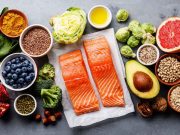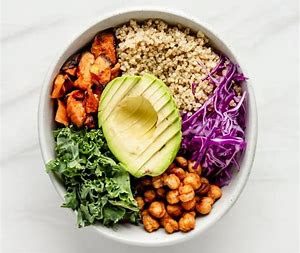Plant-based is a focus on foods primarily from plants. This includes fruits, vegetables, nuts, seeds, oils, whole grains, legumes, and beans. It does not mean that you are vegetarian or vegan and never eat meat or dairy. Rather, you are proportionately choosing more of your foods from plant sources. I prefer the term, “plant-rich”. It feels more accurate to me. Vegetarian diets come in lots of shapes and sizes, and you should choose the version that works best for you. Bio-individuality is key for people. One person’s medicine is another’s poison. Thus, let’s not think that our BFF’s diet will be award winning for us. So, what are all the names of all these different dietary, plant-based things?
- Semi-vegetarian- includes eggs, dairy foods, and occasionally meat, poultry, fish, and seafood.
- Pescatarian- includes eggs, dairy foods, fish, and seafood, but no meat or poultry.
- Vegetarian- includes eggs and dairy foods, but no meat, poultry, fish, or seafood.
- Vegan- includes no animal foods.
If followed properly, a whole food, plant-based diet limits the use of oils, added sugars and processed foods, leaving only whole foods to provide nutrition. This maximizes nutrient intake and virtually eliminates foods that can lead to poor health outcomes. These diets are low in saturated fat, free of cholesterol, and rich in fiber, vitamins, minerals, and antioxidants. Research also reveals that following this type of diet will lower your risks of heart disease, hypertension (high blood pressure), digestive disease, many cancers and obesity. Studies also show that a plant-based diet can help lower body weight and reduce your LDL cholesterol. You will also gain increased energy levels!
Plant rich diets are naturally more nutrient-dense than standard American diet due to the increase in healthy fruits, vegetables, grains, and beans. Veggies have more vitamins and minerals per calorie than meat and animal products do. Beyond the vitamins, plant-based diets are high in fiber and contain more natural sugars and provide healthier fats. When you get your satiety from plants, it comes with so much more. Eating a healthy plant-based diet can lower your risk for many diseases — some obvious, some a little more surprising. While eating foods naturally lower in saturated fat leads to a lowered risk of heart disease, it can also lower risk for Type 2 diabetes, high cholesterol, and various forms of cancer. While genetics and other lifestyle choices will always play a role in disease risk, a healthy diet is a cornerstone of living with as little illness as possible.
Ok! You want to try to add more plants into your diet. But how?? Here are some tips to help you get started on more of a plant-rich diet.
- Eat those veggies! Fill half your plate with vegetables at lunch and dinner. Make sure you include plenty of colors in choosing your vegetables. Enjoy vegetables as a snack with hummus, salsa, or guacamole.
- Rethink your meat mentality! Have smaller amounts. Use it as a garnish instead of a centerpiece.
- Choose good fats! Fats in olive oil, olives, nuts and nut butters, seeds, and avocados are particularly healthy choices.
- Try to cook one vegetarian meal each week! Build these meals around beans, whole grains, and vegetables.
- Get in the GREENS! Try a variety of green leafy vegetables such as kale, collards, Swiss chard, spinach, and other greens each day. Steam, grill, braise, or stir-fry to preserve their flavor and nutrients.
- Make salads and grain bowls! Fill a bowl with salad greens such as romaine, spinach, Bibb, or red leafy greens. Add an assortment of other vegetables along with fresh herbs, beans, peas, or tofu.
- Have fruit for dessert! A ripe, juicy peach, a refreshing slice of watermelon, or a crisp apple will satisfy your craving for a sweet bite after a meal.
What might be a good recipe to try with lots of flexibility to begin ? Try a “nourishing bowl”!
To make a healthy nourish bowl, simply: Start off with a base of leafy greens. Top with a variety of nutrient dense veggies, protein, carbs and healthy fats. Then bring it all together by drizzling or scattering on some delicious add-ons. Get creative and have fun – the options are endless!
Start off with a base of leafy greens. Some options: spinach, kale, arugula, mixed baby greens, romaine, leaf lettuce, swiss chard, sprouts, microgreens, etc.
Next, top your base of leafy greens with a variety of nutrient dense veggies, protein, carbs and healthy fats. You can sprinkle them on top or arrange them in neat little piles or stripes across the top – whatever makes you happy!
- VEGGIES: They can be raw, roasted or grilled. Pick a few that you enjoy! Some options: carrots, cucumber, cabbage, zucchini, beets, mushrooms, peppers, radish, broccoli, cauliflower, snap peas, green beans, asparagus, Brussel sprouts, etc.
- PROTEIN: Some options: nuts, seeds, beans, lentils, quinoa, tempeh, tofu, eggs, fish and quality meat (chicken, turkey, beef, etc.).
- WHOLE FOOD CARBS: Some options: sweet potatoes, quinoa, rice, corn, squash, whole grains, wild rice, beans, peas, etc.
- HEALTHY FATS: Some options: avocado, nuts, seeds, olives, olive oil, tahini, salmon, etc. USE sparingly.
Lastly, toppings! These are things that you drizzle, scatter and scoop over the top to bring it all together. Some options: homemade or quality store-bought dressings or sauces, fermented veggies like sauerkraut or kimchi, hemp hearts, salsa, hummus, fruit, cheese, guacamole, pesto, nutritional yeast, fresh lemon juice, herbs, spices or seasonings, etc. Again, go lightly on anything fattening or we defeat our intention.
Visit my Instagram page @mostlyplantmama for some easy, family friendly and delicious plant-rich recipes!





































